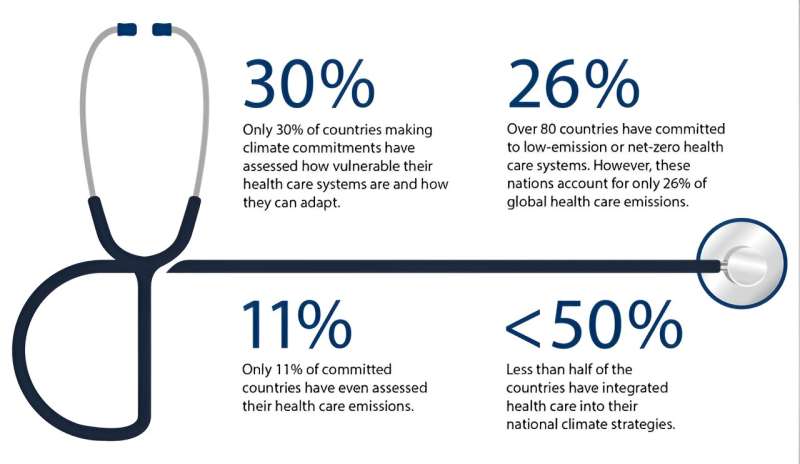A new study reveals that many countries around the world are falling short of their international commitments to improve the sustainability of their healthcare systems. The study, co-led by Yale’s Jodi Sherman, highlights critical gaps in monitoring progress, a lack of planning for resilience, and the concerning issue of ‘greenwashing’. This issue is crucial as the healthcare sector contributes nearly 5% of global greenhouse gas emissions and heavily impacts public health. Addressing sustainability in this sector is vital for mitigating climate change and ensuring healthcare systems can withstand future challenges.

Failure to Assess and Monitor Emissions
The study analyzed the progress of over 80 countries that agreed to the key initiatives of the COP26 Health Program, which aimed to promote climate-resilient and low-carbon healthcare systems. However, the researchers found that only 30% of these countries had conducted essential vulnerability and adaptation assessments of their healthcare systems. Furthermore, just 11% of the 85 countries that committed to adopting low-emission or net-zero healthcare systems had even assessed their healthcare emissions.
This lack of data collection and monitoring is a significant obstacle to achieving meaningful progress. Without a clear understanding of the current state of the healthcare sector’s environmental impact, it becomes nearly impossible to develop and implement effective strategies for improvement. The authors of the study express deep concern over this issue, noting that the absence of robust, outcome-oriented indicators raises the risk of ‘greenwashing’ – the illusion of progress without tangible results.
Integrating Healthcare into Climate Strategies
Another key finding of the study is that less than half of the countries have integrated healthcare into their national climate strategies. This disconnect between the healthcare sector and broader climate action plans is a concerning oversight. Healthcare systems are not only impacted by climate change but also contribute significantly to greenhouse gas emissions, making their inclusion in national strategies a critical necessity.
The authors emphasize the need for countries to prioritize the integration of healthcare into their climate change mitigation and adaptation efforts. By aligning healthcare policies with broader environmental goals, nations can ensure a more holistic and effective approach to addressing the intersections between climate, health, and sustainability.
Transforming Healthcare for a Sustainable Future
The study’s authors call for a fundamental transformation of healthcare systems to make them more sustainable, resilient, and aligned with global climate commitments. This includes developing and implementing robust outcome indicators to track progress, as well as increasing investment and planning for healthcare sector resilience.
Tackling the sustainability challenges within the healthcare industry will require a multi-faceted approach. Policymakers must work closely with healthcare professionals, environmental experts, and community stakeholders to develop comprehensive strategies that address emissions, resource consumption, and the overall environmental impact of healthcare operations. Only through a collaborative and data-driven effort can countries hope to fulfill their international pledges and create a more sustainable healthcare landscape for the future.
